Whole Foods may refer to:
- Whole foods, a group of foods that are unprocessed and unrefined
- Whole Foods Co-op, a food cooperative located in Duluth, Minnesota
- Whole Foods Market, an organic supermarket chain owned by Amazon
Whole Foods may refer to:
A macrobiotic diet is an unconventional restrictive diet based on ideas about types of food drawn from Zen Buddhism. The diet tries to balance the supposed yin and yang elements of food and cookware. Major principles of macrobiotic diets are to reduce animal products, eat locally grown foods that are in season, and consume meals in moderation.

Barbecue or barbeque is a term used with significant regional and national variations to describe various cooking methods that employ live fire and smoke to cook the food. The term is also generally applied to the devices associated with those methods, the broader cuisines that these methods produce, and the meals or gatherings at which this style of food is cooked and served. The cooking methods associated with barbecuing vary significantly but most involve outdoor and indoor cooking.
Composition or Compositions may refer to:
Stabilizer, stabiliser, stabilisation or stabilization may refer to:
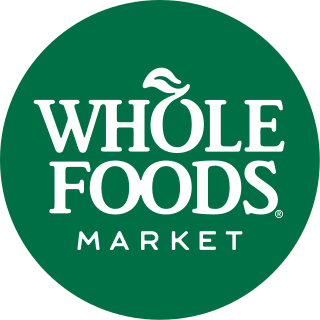
Whole Foods Market, Inc. is an American multinational supermarket chain headquartered in Austin, Texas, which sells products free from hydrogenated fats and artificial colors, flavors, and preservatives. A USDA Certified Organic grocer in the United States, the chain is popularly known for its organic selections.

Upma, uppumavu, or uppittu is a dish of thick porridge from dry-roasted semolina or coarse rice flour. Upma originated from South India, and is most common in Kerala, Andhra Pradesh, Tamil Nadu, Odisha, Telangana, Karnataka, Maharashtra, and in Sri Lankan Tamil communities. Often, depending on preference, it has various seasonings and/or vegetables added during cooking.
A jingle is a short song or tune used in advertising and for other commercial uses. Jingles are a form of sound branding. A jingle contains one or more hooks and meanings that explicitly promote the product or service being advertised, usually through the use of one or more advertising slogans. Ad buyers use jingles in radio and television commercials; they can also be used in non-advertising contexts to establish or maintain a brand image. Many jingles are also created using snippets of popular songs, in which lyrics are modified to appropriately advertise the product or service.

A healthy diet is a diet that maintains or improves overall health. A healthy diet provides the body with essential nutrition: fluid, macronutrients such as protein, micronutrients such as vitamins, and adequate fibre and food energy.

John Powell Mackey is an American businessman and author. He is the co-founder of Whole Foods Market and was the chief executive officer of the company from its inception in 1980 until his retirement in 2022. He is currently the CEO of Love.Life, which he also co-founded.
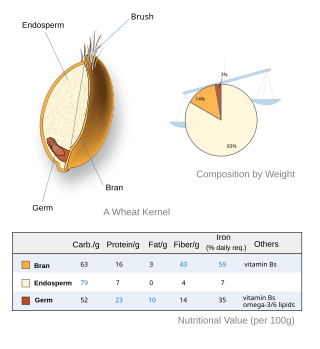
A whole grain is a grain of any cereal and pseudocereal that contains the endosperm, germ, and bran, in contrast to refined grains, which retain only the endosperm.
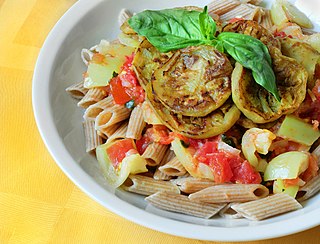
Diet food refers to any food or beverage whose recipe is altered to reduce fat, carbohydrates, and/or sugar in order to make it part of a weight loss program or diet. Such foods are usually intended to assist in weight loss or a change in body type, although bodybuilding supplements are designed to increase weight.
Salmagundi is a cold dish or salad made from different ingredients which may include meat, seafood, eggs, cooked and raw vegetables, fruits, or pickles. In English culture, the term does not refer to a single recipe but describes the grand presentation of a large plated salad of many disparate ingredients. These can be arranged in layers or geometrical designs on a plate or mixed. The ingredients are then drizzled with a dressing. The dish includes a wide range of flavours and colours and textures on a single plate. Often recipes allow the cook to add various ingredients which may be available at hand, producing many variations of the dish. Flowers from broom and sweet violet are often used.

Sustainable diets are "dietary patterns that promote all dimensions of individuals’ health and wellbeing; have low environmental pressure and impact; are accessible, affordable, safe and equitable; and are culturally acceptable". These diets are nutritious, eco-friendly, economically sustainable, and accessible to people of various socioeconomic backgrounds. Sustainable diets attempt to address nutrient deficiencies and excesses, while accounting for ecological phenomena such as climate change, loss of biodiversity and land degradation. These diets are comparable to the climatarian diet, with the added domains of economic sustainability and accessibility.

Laing, is a Filipino dish of shredded or whole taro leaves with meat or seafood cooked in thick coconut milk spiced with labuyo chili, lemongrass, garlic, shallots, ginger, and shrimp paste. It originates from the Bicol Region, where it is known simply as pinangat. Laing is also a type of ginataan, and thus may also be referred to as ginataang laing. Laing is commonly eaten as a vegetable side to complement meat or fish side dishes known as ulam in Filipino, which is normally paired with boiled white rice.

Historically, Inuit cuisine, which is taken here to include Greenlandic, Yupʼik and Aleut cuisine, consisted of a diet of animal source foods that were fished, hunted, and gathered locally.

Gabonese cuisine is the cooking traditions, practices, foods and dishes associated with Gabon, a sovereign state on the west coast of Central Africa. French cuisine is prevalent as a notable influence, and in larger cities various French specialties are available. In rural areas, food staples, such as cassava, rice and yams, are commonly used.
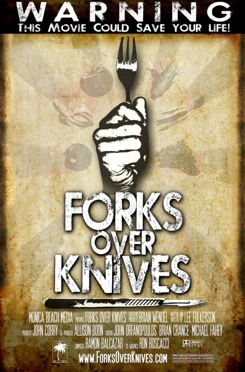
Forks Over Knives is a 2011 American documentary film which argues that avoiding animal products and ultra-processed foods, and instead eating a whole-food, plant-based diet, may serve as a form of chronic illness intervention.
Kristi Funk is an American breast cancer surgeon known for her surgical treatment of celebrities Angelina Jolie and Sheryl Crow and her advocacy of whole-food plant-based nutrition.
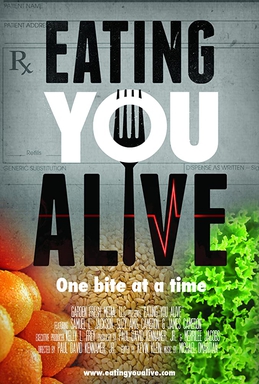
Eating You Alive is a 2018 health documentary film about why Americans are suffering from chronic diseases such as cardiovascular disease, diabetes, obesity, autoimmune disease, among other diseases, and whether the outcome can be changed.

Alan Desmond is an Irish consultant gastroenterologist and writer known for his advocacy of plant-based nutrition. He has argued that a whole food plant-based diet may prevent many diseases.